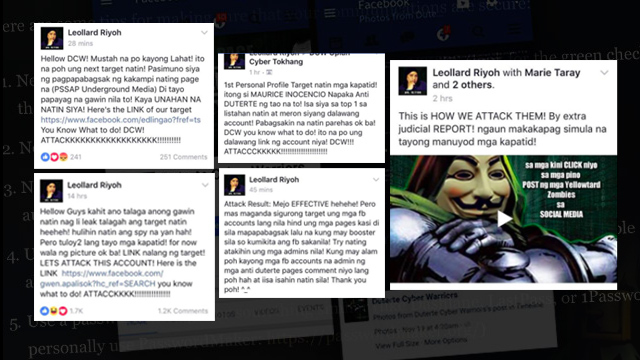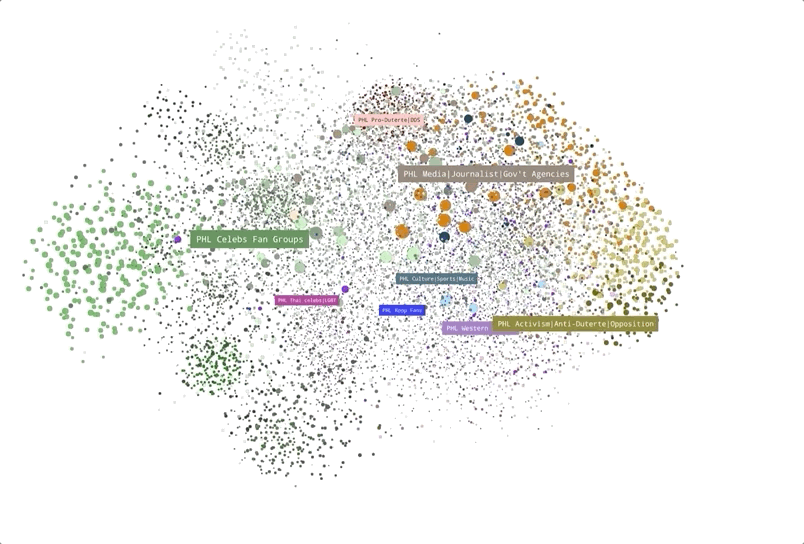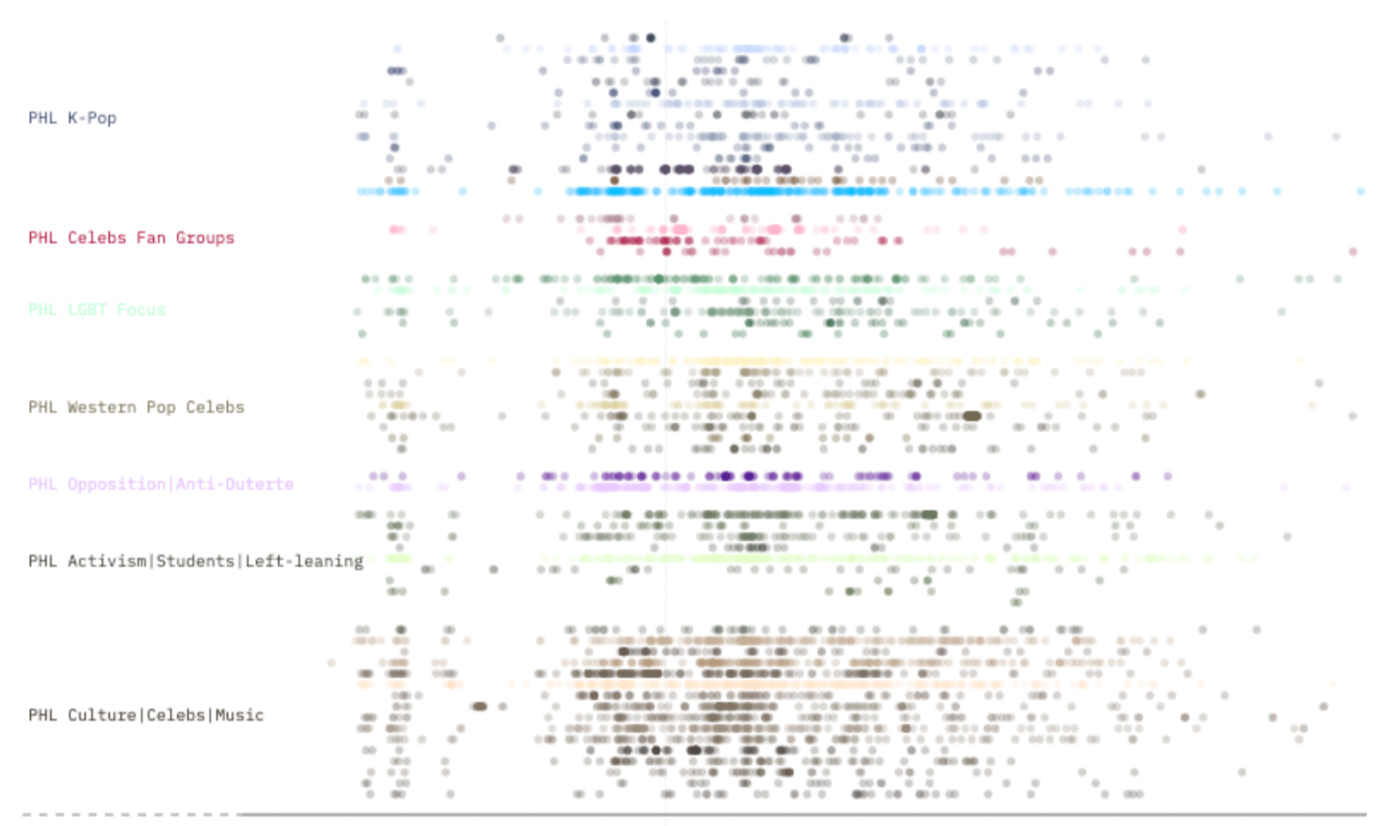SUMMARY
This is AI generated summarization, which may have errors. For context, always refer to the full article.

After the country’s largest television network was forced to shut down by the Philippine government, supporters of the administration were on double duty to fend off the online backlash.
Taking from their old but trusty playbook, they made “#YesToABSCBNShutdown” trend (the same hashtag promoted by fake accounts taken down by Twitter a month ago), while more influential propagandist-bloggers attacked and responded to critics.
The information operations then were as potent as ever, but not enough to contain an online crisis of its scale. The machine found itself face-to-face with bigger enemies: not only were they up against massive public outcry, but also against TV personalities with larger clout and swarms of agile, loyal, and organized online fan groups.
#WeBlockAsOne
In attempts similar to old propaganda machine tactics, fans of ABS-CBN celebrities, who have largely stayed off politics before, campaigned to not only support their idols’ TV network but fend off “trolls” by reporting them en masse.
On May 13, Kathryn Bernardo joined many other ABS-CBN actors in speaking up about the shutdown of their home network. In a video posted on her instagram account, Bernardo asked Filipinos to “learn to stand up for what’s right.” She explained how the shutdown of ABS-CBN was a labor, public health, and press freedom issue. Meanwhile, her real-life beau, actor Daniel Padilla, also defended other celebrities breaking their silence about the issue.
A day later, Byron Cristobal, known online as Banat By, uploaded his own video on Facebook, responding to their videos and sarcastically praising Kathryn’s “acting.” Cristobal is the manager of Duterte supporter and blogger Mocha Uson and is also known for handling her official Facebook page. Cristobal’s video was also shared on Uson’s blog page and amplified by the propaganda machine.
Almost immediately, fans of Bernardo and Padilla, known mostly as “Kathniel” fans, counterattacked with a massive campaign on Facebook and Twitter, calling for users to report Cristobal’s blog accounts for abuse, using the hashtags #WeBlockAsOne and #StarveTheTrolls.
Thousands of Facebook and Twitter accounts in the KathNiel network mobilized to push the hashtags on top trending charts, and were amplified not only by anti-administration networks, but other fan groups, especially of other ABS-CBN celebrities. By 10 pm of May 14, #WeBlockAsOne peaked as number one on Twitter, with over 90,000 tweets. At one point, the hashtag was more talked about on Twitter than ABS-CBN itself.
The swarm was also felt on Facebook, where there are also hundreds of KathNiel pages and groups. Similar to how the propaganda machine distributes content on Facebook, we saw hundreds of posts with mentions of #WeBlockAsOne from fans, amplified by fandom pages and groups.
Existing anti-administration networks also welcomed the campaign, amplifying it within their own spaces. Rappler found 203 Facebook groups and pages that posted about the hashtag on May 14, with a total following of almost 20 million users.
The following days saw a back and forth between the fandoms and the propaganda machine. Cristobal continued to respond to the backlash but was still met with the fandom’s strong anti-troll campaign.
On May 16, #SakangSiKathryn, which means “Kathryn is bow-legged,” trended on Twitter after “DDS” lawyer Ferdinand Topacio used it in a tweet, later picked up by other Duterte supporters. Fan groups were quick to respond, calling out “trolls” for “body-shaming,” and campaigning again with #WeBlockAsOne and this time, with #ReportTheTrolls.

The irony of this is that “mass reporting” is an old tactic from the propaganda machine’s playbook. In 2016, allegedly after its community standards were violated, Facebook suspended several pages and accounts critical of the Duterte administration and the hero’s burial given to the late dictator Ferdinand Marcos.
This came after a group who called themselves “Duterte Cyber Warriors” organized online supporters of President Rodrigo Duterte to join an operation they called “Oplan Cyber Tokhang” –coined after “Oplan Tokhang,” the police’s deadly campaign against drugs.
Volunteers were added to a secret Facebook group where they were given “missions” to “attack” those who are “spreading false information” online by reporting them en masse. At the same time, the leaders of the group warned about “special ops,” which included attempts of hacking and social engineering, targeting critics of the government. Later, the group admitted that rumors about them “hacking” detractors were not true and were intentionally spread by them to incite fear.
Dominating the machine
This is not the first time fandoms have managed to steer the conversation against the machine, but their capability to dominate narratives online have never been more apparent as when their idols’ TV network was put in the machine’s crosshairs.

Data from Graphika which looked into the accounts that used hashtags related to ABS-CBN’s shutdown showed that various fan groups on Twitter largely dominated the conversation, dwarfing even the Duterte network’s own #YesToABSCBNShutdown campaign, and even the network of news organizations and activists against the administration.
This includes clusters of fan groups of celebrity couples (eg. KathNiel, JaDine, LizQuen) and fans of international celebrities like K-pop and Thai celebrities – interest groups that are usually mum about politics online.
Fan clusters have also been largely involved in previous scans where the propaganda machine was drowned out by public outcry, as was the case in the #OustDuterte campaign in April.

The power of fan groups
What makes online fan groups effective in steering online conversations is similar to what makes propaganda and disinformation networks effective: volume and connectedness.
Fandoms online are made of fragmented communities, usually segmented by location or focus (eg. “bias” towards a specific member of a group/couple).
For example, the graph below shows at least 191 Facebook pages and 70 groups dedicated to the KathNiel fandom. Followers of these pages range from a few thousands to more than a million each. In total, these groups and pages have more than 18 million followers and members.
Shared interests provide for strong connections within fan groups and between a fan group to another. Dedicated fans are able to find a community of like-minded individuals within social media platforms, and these communities essentially become echo chambers that further heighten their members’ loyalty to the fandom’s cause.
The effectiveness of Filipino fandoms online first came to global attention with Aldub, the popular duo of Alden Richards and Maine Mendoza which peaked in popularity in 2015. Many of the fan accounts on Twitter for Aldub were managed by multiple administrators who voluntarily took turns to make sure they produced fan content consistently round the clock, with some even having OFWs take the wheel during wee hours in the Philippines.
With their effort, the network of AlDub fan accounts became a phenomenal force on Twitter that was able to make hashtags trend every day. They were even able to generate 41 million tweets with #AlDubEBTamangPanahon in October 2015, recognized by The Guinness World Record as the most used hashtag in a single day. (READ: ‘How AlDub is breaking the internet‘ )
Potential for abuse
While these communities are scattered online, Facebook and Twitter algorithms still make it easy for users to discover relevant content on their feed, allowing fan content to spread fast across these online watering holes without the need for tight coordination between admins of different groups (which is close to impossible due to their sheer volume).
On top of this, fan accounts are able to get a high following, all while maintaining the anonymity of the people behind the screen. This adds a layer of protection for the account owners’ personal lives, or even masks hidden agenda and conflicts of interest, if any.
This makes fandoms extremely effective distribution channels for content creators – including however, propagandists and peddlers of disinformation.

In 2016, Twinmark Media, which touted itself as a “digital news outfit,” leveraged on these insights and created a distribution network of different entertainment and fan pages.
Their content, often laced with disinformation and political propaganda, were coursed through this network, which includes both official celebrity accounts and unofficial fan pages. Facebook eventually took down 220 Facebook pages, 73 Facebook accounts and 29 Instagram accounts belonging to the Twinmark Media network. (READ: ‘What is Mocha Uson’s top source of news?‘ )
There are also concerns that some Facebook groups were being grown as fan communities, only to be sold and turned into a distribution channel for other types of content.
For example, in 2018, a Facebook group that initially started out as a fan group for South Korean actor Kim Soo-hyun was surreptitiously changed into one called “President Duterte Supporters.” The account behind the name-change was also found to be a member of other pro-administration groups such as “President Duterte V.P Marcos Worldwide Supporters,” “President Rody Duterte Facebook Army,” and “President Duterte News.”
The type of content these fan pages push out, entertainment and humor-related, are also effective in reaching out to demographics that may otherwise be tuning out of political discussions. This is similar to how, in a 2019 study by Jonathan Ong, Ross Tapsell, and Nicole Curato, disinformation operations and political propaganda were seen tapping into niched groups and micro- and nano-influencers with a steady stream of entertainment and lifestyle-related content, quietly interspersed with political messaging.
Even outside the Philippines, there have been cases when these communities have been successfully funneled into political discussions.
In April 2020, for example, we saw the birth of the “Milk Tea Alliance,” a ragtag group of youth from various Southeast Asian countries – with a shared love for milk tea – who united online to fight against China’s notorious online trolls. What became a new player in geopolitical discussions, was in fact an offshoot of a meme war between Thai and Chinese fan groups.
In milk tea we trust #ชานมข้นกว่าเลือด #MilkTeaAlliance pic.twitter.com/iqA6LYa6Mr
— yumi (@yumi50707609) April 15, 2020
A series of events involving a popular Thai actor and his rumored girlfriend were interpreted as insults to the One China Policy by Chinese fans who jumped into banned social media platforms to attack the two, and throw in nationalistic insults against Thai users.
Thai fans were quick to respond with wit and humor, which observers say, effectively highlighted the ignorance of many Chinese users of the world outside the Great Firewall.
The Thai fans’ response has since been noticed by youth from other countries with strong feelings against the Chinese Communist Party’s aggressive territorial claims and oppressive foreign policy, This snowballed into a movement joined by social media users from countries like Hong Kong, Taiwan, and even the Philippines.
These show that while most members of fan groups are akin to the “undecideds” in the political spectrum, or the silent majority who choose to keep their political opinion away from the public, there are rare instances when they step into spaces outside entertainment and pop culture.
And with their sheer volume and organization online, they’re capable of dominating the conversation. So while they typically keep to themselves and stray from politics, the role of online fandoms in our information ecosystems, and their vulnerability for abuse, should not be overlooked. – With reports from Akira Medina/Rappler.com
Add a comment
How does this make you feel?
There are no comments yet. Add your comment to start the conversation.